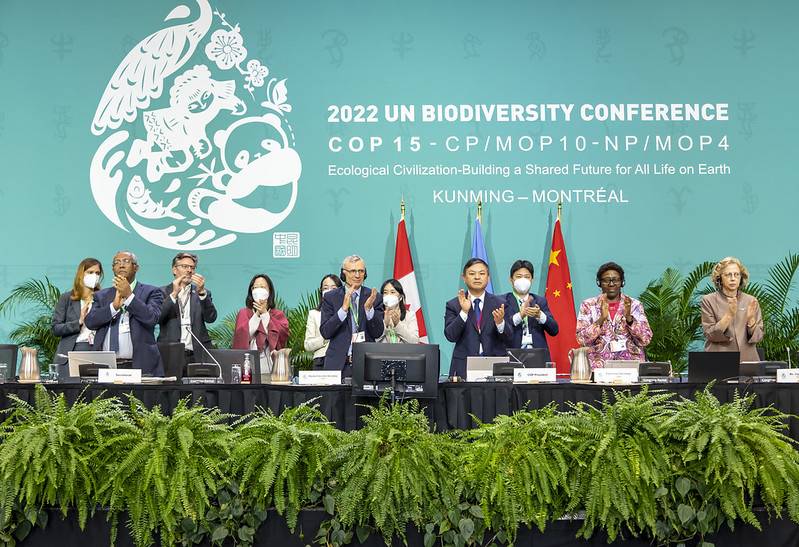
COP15 Global Biodiversity Framework: 196 Countries to Require All Large Business and Financial Institutions to Assess And Disclose Their Risks, Impacts And Dependencies On Nature
What a way to finish 2022! With an unprecedented number of progressive companies attending COP15 and thanks to country negotiators working tirelessly over the past few weeks, a new Kunming-Montreal Global Biodiversity Framework (GBF) has been adopted. We at BSL welcome this historic agreement as it defines our common goal to halt and reverse nature loss by 2030, commits governments to require all large business and financial institutions to assess and disclose their risks, impacts, and dependencies on biodiversity, and promises comprehensive reform of environmentally harmful subsidies. This simply wouldn’t have happened without the effort and teamwork from a huge number of organizations, including many of our partners and leading companies stepping and showing up.
Business leadership and momentum
Business for Nature’s Executive Director, Eva Zabey outlining the outcomes for business at the closing of the High-Level Segment.
In a week of high stakes and high drama – with a tense World Cup thrown in for good measure (congratulations, Argentina) – it was exciting if a little emotional to see a new global agreement on nature adopted by 196 countries in Montreal in the early hours of 19 December. A united voice of progressive businesses had played a critical role in driving momentum and leadership in the run-up to COP15, and many companies showed up on the ground to urge governments to secure a Paris-style agreement on nature. 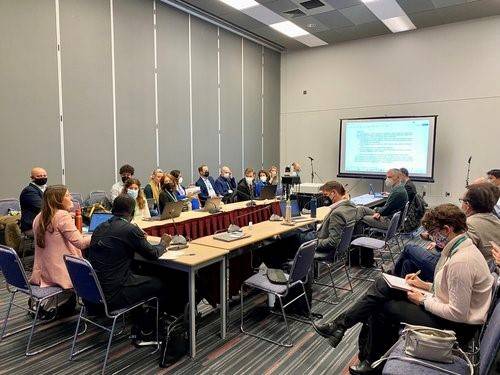
Business Briefing sessions were hosted every morning to provide the latest updates on negotiations during COP15.
Hundreds of corporate leaders contributed to a wide range of business and finance events as either speakers or participants, including the official side events, the Business and Biodiversity Forum, the Business Hub in Place Quebec, the Nature Positive Pavilion, the Global Environment Facility pavilion and in offsite events such as TNFD’s Nature Labs. These rich conversations and discussions gave participants a shared sense of responsibility and, importantly, a feeling of being part of a like-minded business community committed to tackling the collective challenges we face.
We thank the CBD Secretariat and the GBF co-chairs who really lived up to the goal of delivering a Global Biodiversity Framework (GBF) that takes a whole-of-society approach. Observers were welcomed in the negotiation rooms for most sessions – an effective way to engage stakeholders directly. This promoted a genuine and continuous interest in the status of the negotiations.
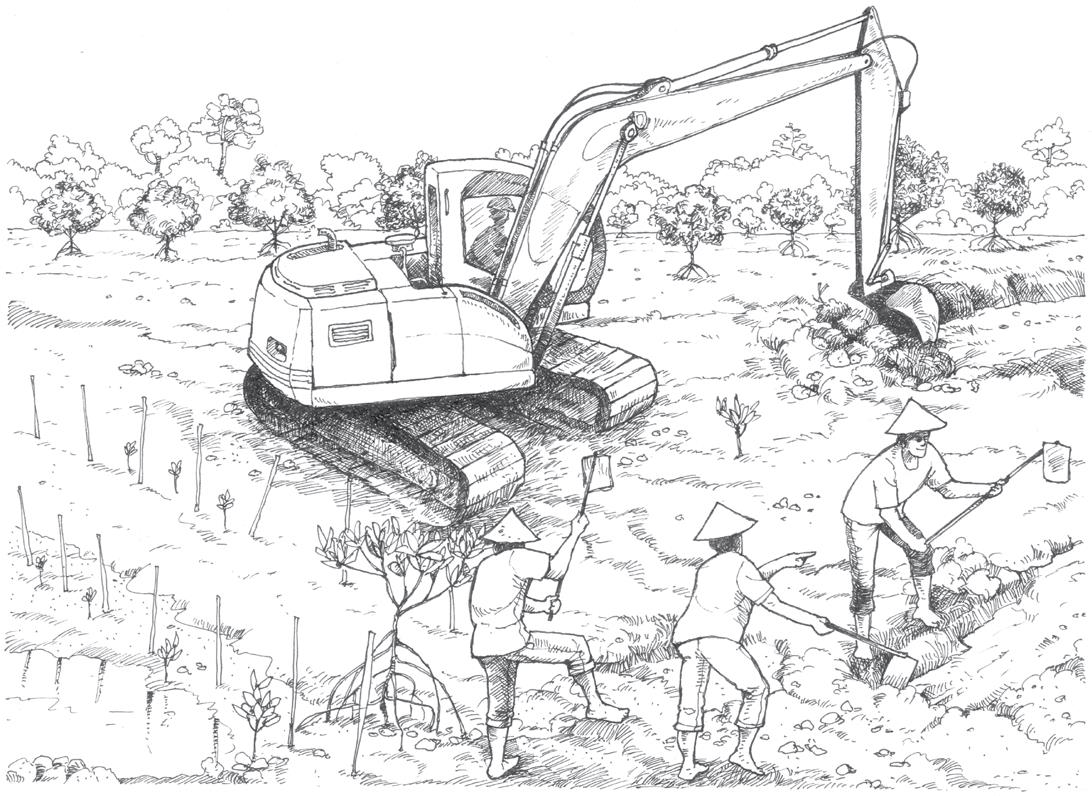
Progressing At the Anawilundawa Wetland Restoration Site
More about our flagship project being undertaken jointly with the Department of Wildlife Conservation (DWC), the Wayamba University of Sri Lanka and selected private sector partners in the Anawilundawa Ramsar wetland sanctuary…
Phases of the project
Data collection on-site is as follows,
- Site assessment for the flora – completed
- Site assessment for fauna – Mammals, birds, fish, reptiles, amphibians, gastropods, crabs, and shrimps – ongoing
- Site assessment for threats – ongoing
- Site assessment for soil and water – completed
Bird watching
Floral survey
Water sample checking – pH, conductivity, temperature
Soil samples collecting – for soil carbon tests, pH
- Preparation of the grounds – completed (plot 07)
- Plots adjacent to the Dutch canal (to the west of the central canal) will be restored with mangroves and salt marsh species depending on the ability of the plants to colonize.
- DWC will create two constructed wetlands in the restoration area to provide habitats for fauna and other organisms.
- Plots to the west will be irrigated by means of individual canals to ensure the tidal flow of water from the Dutch Canal.
- Each partner responsible for the plots are expected to bear the cost of such hydrological interventions (construction of canals).
- The location of each plot’s canal will be decided on a case-by-case basis considering the topography (land elevation), existing flora, and most environmentally beneficial approach.
- Within each plot, depending on the contours within the plot, inner channels will be constructed. The width, depth, and design will be on a case-by-case basis.
Design – plot 07
Before
After
Remaining tasks
- Nursery management.
Nursery maintenance should be carried out with the support of the local community as a means of livelihood enhancement for them. Quotations should be called by DWC and the cost borne equally by all partners. The list of species is that should be raised at the nursery. Data sheets to be maintained at the nursery for growth monitoring and survival.
The same data sheet should be used for each plot to monitor the growth of approximately 100 tagged plants.
Nursery plants should be transferred to the definitive plots between 3-4 months of bagging.
Rhizophora mucronata dominates the Dutch Canal bank and areas where tidal water influx is significantly higher. Hence, R. mucronata will be used only in areas where such conditions are available. Also, direct planting is performed with mature hypocotyls at the right time after rain when the plots are acclimatised, the survival and growth rates are higher.
Other species – Avicennia marina, Avicennia officinalis, Bruguiera cylindrical, Aegicerus corniculatum, Nypa fruticans, Xylocarpus granatum, Heritiera littoralis, Lumnitzera racemose, Excoecaria agallocha
Specie – Excoecaria agallocha
Specie – Avicennia officinalis
- Gap filling.
Gap filling should be done only after removing the dead plant and soil associated with it. Gap filling should be done using the plants raised in nurseries. Also, mangrove associates should be used in gap filling.
- Maintenance of hydrology status.
Weekly observations of constructed channels should be done and log books should be maintained. Especially after heavy rains and floods, maintenance should be done. This avoids major maintenance.
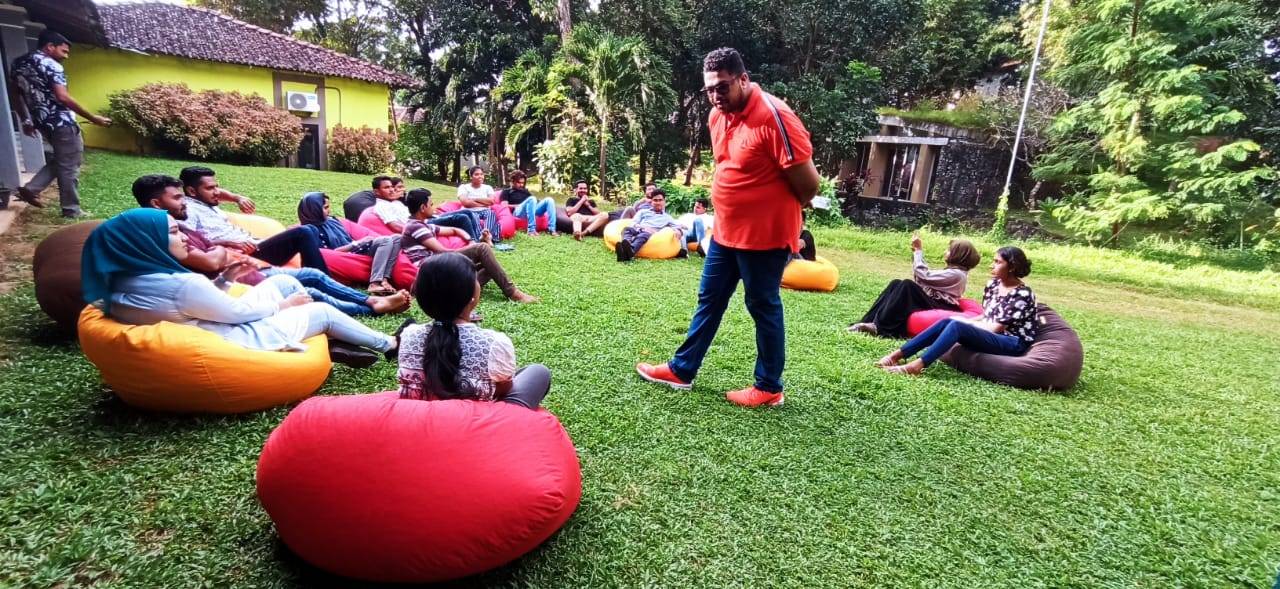
Working With Budding Youth Action Activists
24 candidates from the Colombo district were selected and trained to be leaders in climate action under the auspices of the Youth Leadership for Climate Action (YLCA) Project, funded by the British Council and implemented by Biodiversity Sri Lanka with technical support from Curve Up. The training program was conducted over a period of nine days, in all three languages. Split into 3 segments, the 1st two segments were residential training programs whilst the 3rd segment was a non-residential training program. Both the first and second training segments were conducted successfully, along with activities for skills development, climate awareness, and entertainment for the participants. The sessions were focused on the YLCA Learning Journey (YLCA River Journey), which is conducted in 5 phases: Me, Me, and You, We Together, Social Action, and Locally engaged-globally connected.
Here is a cross-section of participant feedback:
- “Compared to previous workshops we’ve attended, YLCA made each one of us gets involved in all the activities, keeping us away from boredom.” – Shaheer Ahamed
- “YLCA has made me look at the environment around me with a different perception, for example, I see a tree as something which helps reduce pollution in the air.” – Fathima Nawreen
- “Thank you so much for the excellent training. We were quite pleased with how much fun you made it for us! We gained a lot of knowledge. We were strongly urged to participate by the excellent facilitators.” -Kithiyon Yoganathan
- “The YLCA training program helped me a lot to think differently in terms of biodiversity and climate change.” – Junali Shaini
- “The program has instilled good values in me, to see the unseen side of climate change”. – Jathujan Mahendran
After a comprehensive training session on project development, along with expanded virtual discussions on the project proposals, followed by ideation and prototyping workshops, candidates were inspired to raise 8 project ideas (Individual & group), focused on climate change and biodiversity.
Here are some of the Community Intervention Projects:
- Spread awareness on Biodegradable diapers and the long-term goal to introduce an appropriate biodegradable diaper product to the market.
- Upcycling the fabric waste to reduce the open burning of fabric waste and produce a new product.
- Tree planting program with the involvement of the children living under probation to enhance the air quality in the area while reducing air pollution and fostering a positive mindset in the children who are a part of the program.
- Make a video documentary to spreading awareness of environmental harm from lunch sheets.
- Eco-friendly play items for kids are designed and produced using wood waste materials. By utilizing eco-friendly toys instead of plastic ones, this encourages improving children’s attitudes while reducing plastic usage and waste.
- Spread awareness on the value of the wetlands, based on Bellanwila- Aththidiya Sanctuary. The long-term objective is to organize youth-focused wetland activist groups in the Aththidiya Sanctuary area.
- Innovative ways to manage garbage in schools through awareness, introducing waste management system, 3R, school gardening, etc
- Introduce a proper solution for food waste management by converting food waste into compost using a machine called a food waste accelerator.
Candidates will begin their three-month community intervention initiatives after the third segment of the training. While the intervention projects are in progress, a networking program for the candidates will be held on the first week of February 2023, with the involvement of stakeholders from the public and private sectors. At this event, the project teams will present their concepts, and the best project concept, best presenter, etc. will be chosen. Candidates from Kandy and Gampaha will also take part.
Keep in touch with us for more updates on this fascinating program.
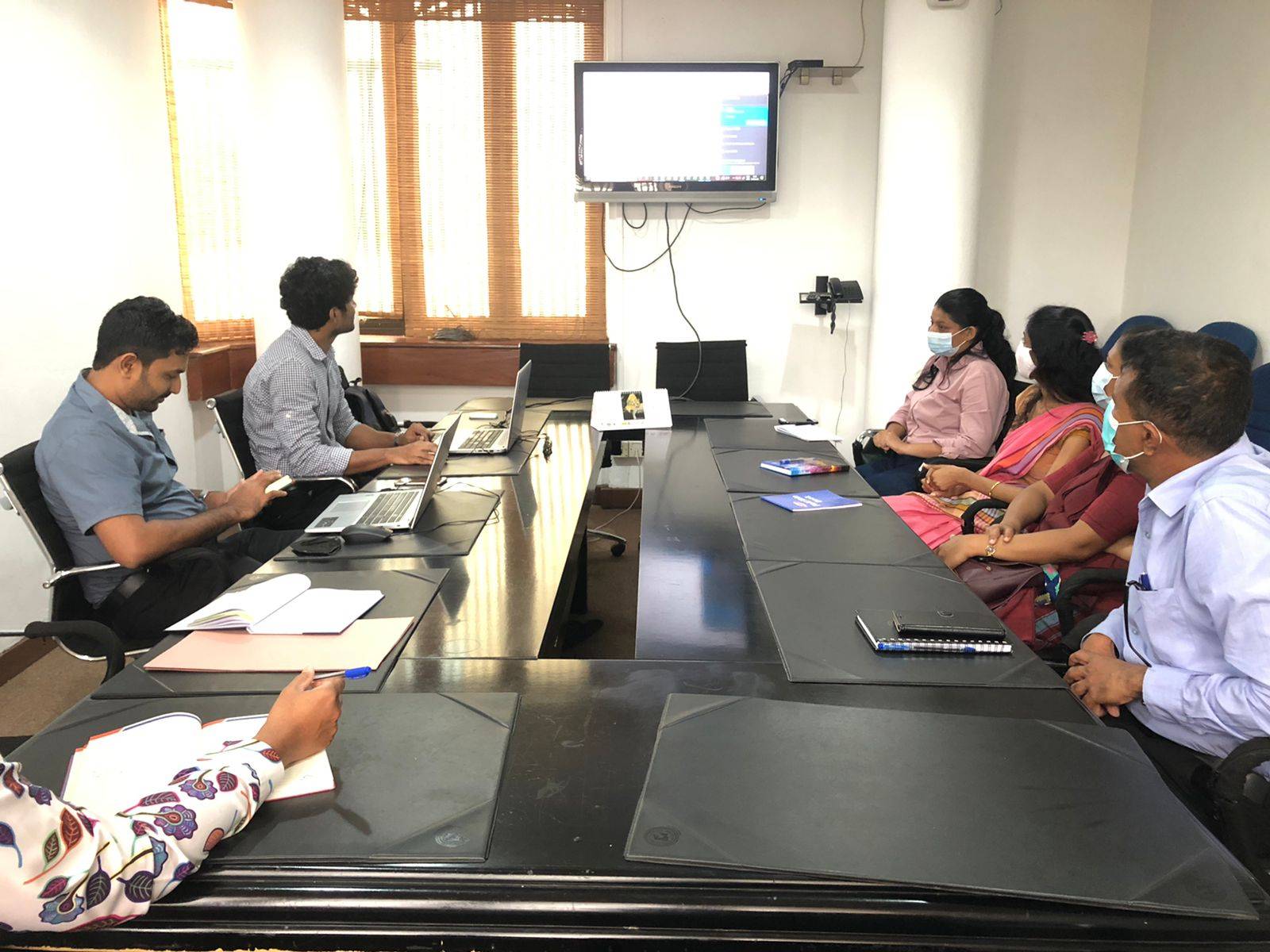
The On-Line EPR Portal To Be Housed and Managed At CEA
With funding from the Clean Cities Blue Oceans (CCBO) initiative of the United States Agency for International Development (USAID), the Ceylon Chamber of Commerce (CCC) and Biodiversity Sri Lanka (BSL) developed an Online Plastic Waste Reporting Portal for Extended Producer Responsibility (EPR) Obligatory Companies. On June 16, 2022, the Project officially inaugurated the EPR system for the environmentally responsible management of plastic waste. To access the online portal, visit www.epr.lk. The platform was developed by Virtusa Pvt Ltd., on which the private sector will commence reporting on waste collection and recycling.
The initiative aims to increase plastic waste collection and recycling to minimize plastic pollution at the national level. The Online reporting portal has been endorsed by the Ministry of Environment (MoE) and the Central Environmental Authority (CEA) and welcomed by the private sector.
As suggested by PET and HIPS Consortia Members, the CCC and BSL are now in the process of handing over management and monitoring of the Online Reporting System to the CEA. With this transfer, EPR-Obligatory firms are expected to use the system to submit information on their plastic waste usage and collect-back accomplishments to CEA. In this regard, the Project had several meetings with the Senior Management Team of CEA. Following these negotiations, CEA confirmed that they are prepared to manage the online reporting system’s backend. Furthermore, they reaffirmed their utmost collaboration and support to the Project. In order to formalize the engagement an MoU between the CCC and the CEA will cement the relationship between the parties.
Launch of the online reporting system
The Project conducted a training program for selected employees of CEA and provided them with the necessary equipment to handle the online portal. The CEA will soon convene a meeting with the PET and HIPS Consortia Members at which the brand owners would be informed that CEA has taken over the responsibility of managing the Online Reporting System. They will be requested to report on manufacturing and collection figures from January 2022 onwards into the Portal. It has been agreed that a three-month pilot run of the system would help uncover problems and the adjustments that may be required to be made.
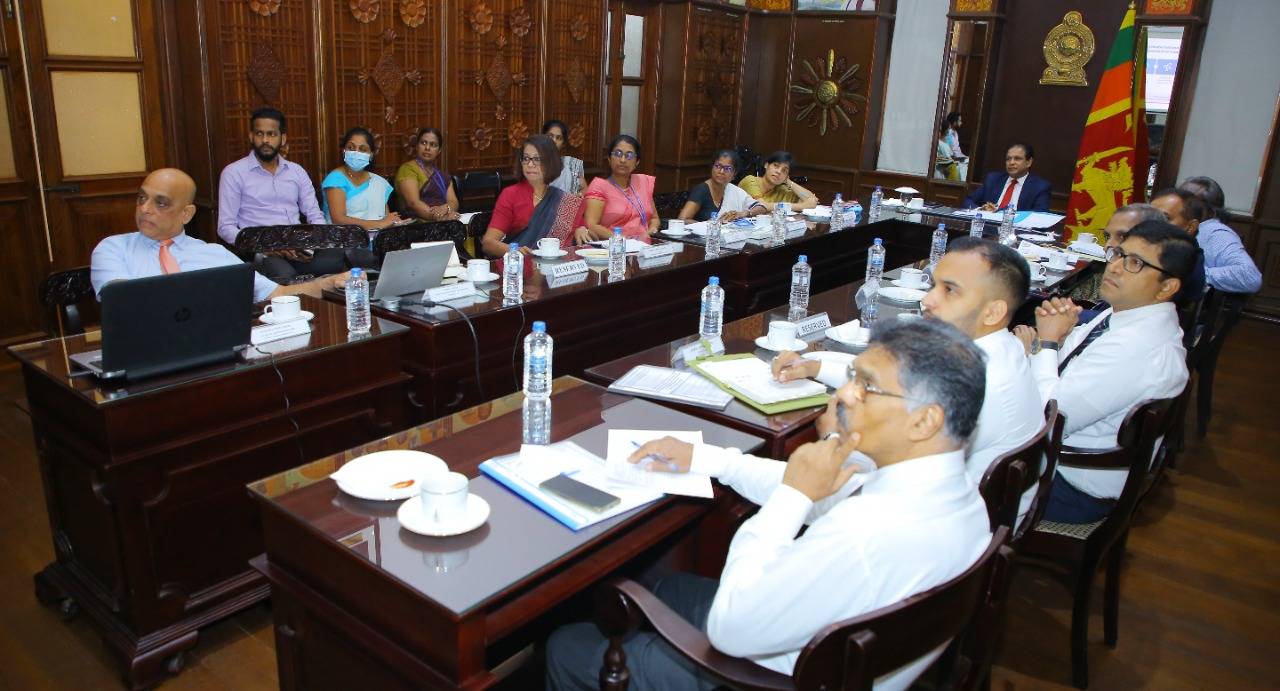
BSL Engages In Efforts At Streamlining Contribution Of The Private Sector Towards Achieving The Sustainable Development Goals
BSL attended a discussion, chaired by Mr. Anura Dissanayake, Secretary to the Prime Minister along with many other distinguished guests, which was held recently, on the contributions of the Private Sector, Non-Governmental Organizations, and Civil Organizations towards achieving Sustainable Development Goals (SDG) with a special focus on Biodiversity Conservation and Climate Change Mitigation.
Mr. Anura Dissanayake, Secretary to the Prime Minister
Sri Lanka has not been able to accurately report on SDGs and biodiversity-related targets and achievements. Therefore, corrective action is needed to rectify the situation by establishing a mechanism for reporting on more holistic stakeholder contributions including Government, Corporate Sector, non–Governmental Sector, and Community-based Organizations accurately.
BSL, with a membership of approximately ninety (90) private sector corporate bodies, is using an integrated common Data Portal to upload details of member investments and contributions to biodiversity enhancement and all related activities. Thereby, a clear understanding of the contributions made towards biodiversity protection and climate change mitigation by its membership is centralized. It was noted that if the requirements of the Government can be aligned with the established reporting criteria such as ‘Global Reporting Initiative (GRI)’ criteria, it will be much easier to absorb all relevant national data from Private Sector initiatives. The ‘Data Gap’ can also be addressed by maintaining a more comprehensive data system. UNDP assistance could be possible to access to address this data gap.
Mrs. Shiranee Yasaratne – Advisor, Biodiversity Sri Lanka
SLASSCOM is actively engaged in promoting a number of biodiversity and SDG-related initiatives including e-waste management processes, the use of renewable energy, the creation of methods of working from home by reducing transportation which ultimately contributes to energy conservation, and the implementation of flexible working hours, etc. these measures ultimately promote sustainable development practices in their member institutions in the IT sector. It was also noted that a proper and accurate reporting system should be followed as a nation so that external parties can understand the positive steps that Sri Lanka has adopted so far toward achieving the SDGs. The process should be promoted through digital media platforms to attract investors to Sri Lanka which could result in additional Foreign Direct Investments (FDI’s).
Virtusa (Pvt) Ltd presented the “Environmental Social Governance (ESG)” reporting system and the “United Nations Global Compact” Principles at this discussion. The steps that Virtusa has adopted in their reporting process while following GRI standards were described. Accordingly, Virtusa (Pvt) Ltd has effectively contributed toward 12 out of the 17 SDGs through these practices. Virtusa is also following Carbon Footprint Reduction Programs, the Zero Single-use Plastic System, the use of Renewable Energy, the motivation of employees towards SDG, and the Policy of avoiding Bribery and Corruption, etc. It was also stated that as a nation, both Public and the Private Sector should take necessary action to implement clear SDG implementation methods at least now, as the country is gradually trying to revive from the ongoing financial crisis. It was suggested that imposing new regulations to ensure that every company should invest a certain percentage (3%) of its net profit in Corporate Social Responsibility (CSR) initiatives would promote the achievement of SDG targets.
The biodiversity division of the Ministry of Environment is in the process of developing a “Bio Diversity Expenditure Tracking Tool” and it includes the SDGs national target as well as the contribution of the Private Sector. Alliance Finance Company PLC, as a socially responsible corporate body, is using the “Sustainability Standards and Certification Initiatives (SSCI)” platform to integrate sustainability into every aspect of their business with positive and measurable outcomes. He further mentioned that the M/s Alliance Finance is approximately covering 76% of the 17 SDGs by performing actively in achieving financial sustainability by aligning the SDGs with its corporate Vision and Mission. It was suggested that standards are much more essential than guidelines in achieving the SDGs and recommended that those standards be based on social dimensions with a primary focus on the Environment and Society. The private sector should be encouraged to adapt to the proposed standards by the government so that tendency of Private Sector institutions to adapt to the relevant standards will increase.
The Director General – Sustainable Development Council suggested that the composition of the Steering Committee appointed to engage the Private Sector’s contribution to SDGs should be expanded as necessary to incorporate the above suggestions



















